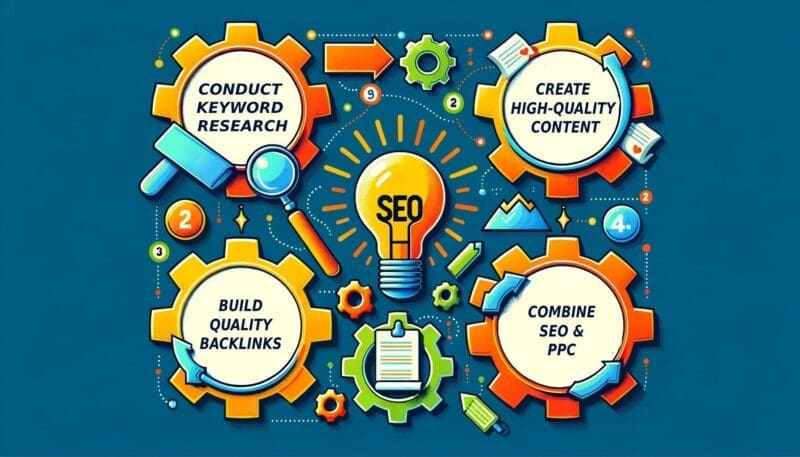In the competitive landscape of higher education, having a strong online presence is crucial. That’s where SEO (search engine optimization) comes into play.
By implementing effective SEO strategies, you can improve the visibility and ranking of your higher education website on search engines. This means more organic traffic and increased exposure to prospective students.
Diving into the world of SEO can be overwhelming for institutional leaders and educators who already have a full curriculum on their plates.
That’s why Amplified Digital Agency is here to help. We’ll not only give you the basics of how SEO works for education institutions, but also take the time burden off your shoulders.
Whether you are looking for helpful tips to implement yourself, or want a turnkey solution to boost your rankings, Amplified is here to help.
The Importance of SEO for Higher Education Websites
In today’s digital landscape, higher education institutions need to prioritize search engine optimization to attract prospective students and faculty. By implementing effective SEO strategies, universities can stay competitive and increase their visibility in search engine rankings. This is especially important in local searches.
One of the key benefits of optimizing higher education websites with relevant keywords (and creating new, optimized content) is improved visibility in search results.
When potential students or faculty members search for specific programs or career information, a well-optimized website will appear higher in the search rankings, making it more likely to be clicked on and visited.
Ranking high in search results not only increases visibility but also demonstrates authority and prestige.
Prospective students are more likely to consider an institution that ranks highly in search results as a reputable and trustworthy option. It shows that the institution is a viable choice and has established itself as a leader in its field.
By investing time and effort into SEO for their websites, institutions can attract more prospective students and faculty members. This increased traffic can lead to higher enrollment numbers, greater brand recognition, and ultimately, a stronger reputation within the academic community.
Strategies to Boost Organic Traffic in Higher Education SEO

To effectively boost organic traffic for higher education websites, there are several key strategies you can implement.
Let’s dive into the details:
Conduct Keyword Research
Start by conducting thorough keyword research to identify popular search terms related to higher education. This will help you understand what your target audience is searching for and enable you to optimize your content accordingly.
You can use tools such as Keyword Tool, SEMrush, or Moz to get started.
Create High-Quality Content
Once you have identified relevant keywords, focus on creating high-quality and informative content that addresses the needs of your target audience.
Your content should be well-written, engaging, and provide value to readers. By offering valuable information, you can attract more organic search traffic.
You can also take your new keyword research and optimize existing pages on your site with keywords that people are actually searching for. You’ll be amazed what tweaking a few keywords on existing content can do for your site’s organic traffic.
Build Backlinks from Reputable Sources
Building backlinks from reputable sources within the academic community is another effective strategy to enhance website authority.
Backlinks are a top 5 ranking factor with Google, and show that other websites see you as a trusted resource and thus want to link to you.
Seek opportunities to collaborate with other educational institutions or influential individuals in your field. These inbound links will not only drive direct traffic but also improve your website’s visibility in search engine rankings.
Combine SEO with PPC Campaigns
While SEO focuses on driving organic traffic, combining it with a good PPC (Pay-Per-Click) campaign can yield even better results. By strategically targeting specific keywords through PPC ads, you can increase visibility and attract more potential students or visitors to your website.
You can work hard to rank a page for a keyword and then stop spending PPC money on that keyword, or you can still run your paid ads and hold your high ranking to completely own the top paid and organic spots for that keyword. It’s a powerful marriage of strategy either way.

By implementing these strategies and staying up-to-date with the latest SEO practices, you can significantly improve organic search traffic for your higher education website and begin to own spots on the SERPs (search engine results pages).
Optimizing Content for Higher Education SEO
Relevant Keywords and Natural Integration
To improve search engine optimization for your institution’s site, it’s crucial to incorporate relevant keywords naturally throughout your website content. This includes using them in page titles, headings, and body text.
By doing so, you increase the chances of your content being indexed and ranked by search engines. Remember: naturally is the key. Otherwise it will be considered keyword stuffing (adding keywords just for ranking purposes), and Google will catch on. Your site won’t get penalized, but your page won’t rank if you are caught stuffing keywords in where they don’t fit.
It’s a delicate balance that often takes a professional to get just right.
Meta Tags for Concise Summaries
Optimizing meta tags, such as meta descriptions, is another essential aspect of higher education SEO.
These tags provide concise summaries of webpage content to search engine users. They are also the title and listing that show up on search results and entice prospective students to click through.
By crafting compelling and informative meta descriptions and titles that include relevant keywords, you can entice users to click on your link when it appears in their searches.

Multimedia Elements for User Engagement
Incorporating multimedia elements like images and videos into your website can significantly enhance user engagement.
Visual content not only makes your pages more visually appealing but also helps convey information more effectively.
For instance, educational institutions can leverage video marketing to showcase their campus facilities or highlight student testimonials.
If you need brand building, especially in the realm of video marketing, check out our services.
Quality Content Creation
Creating great content is key.
Search engines prioritize high-quality and valuable information that meets the needs of users. Therefore, focus on producing well-researched articles that offer unique insights or address common questions within the industry.
Ensure that your titles accurately reflect the content to avoid misleading users.
The good news is you don’t always have to create new content. Optimizing your existing pages and articles is a fantastic way to pick low-hanging fruit and boost your organic traffic.
Avoiding Duplicate Content
Duplicate content can harm your SEO efforts by confusing search engines and diluting the visibility of your webpages.
To prevent this issue, regularly audit your website for duplicate content and take necessary steps to address it. Utilize canonical tags or 301 redirects to consolidate multiple versions of similar pages into a single authoritative URL.
There is also a term called “Keyword Cannibalization”. This means you have 2 or more pieces of content trying to rank for the same search term. Make sure to have one piece of content per search term, and make it the best piece of content out there for that term.
Mobile Optimization and Website Performance for Higher Education SEO

To ensure higher visibility in organic search results and drive more website traffic, it is crucial to optimize your higher education website for mobile devices and enhance its overall performance.
With Google now considering site speed and mobile optimization as top-ranking factors, it’s essential to focus on these aspects of SEO.
Mobile-Friendly and Responsive Design
Make sure your website is mobile-friendly and responsive across different devices.
Mobile search accounts for 55.5% of all internet searches.
This means that the design should adapt seamlessly to various screen sizes, providing an optimal user experience. Since you are targeting a young audience of students, this also increases the importance of having a site that’s well-optimized for mobile.
A responsive design ensures that your content is easily accessible and readable on smartphones, tablets, and desktops.
Improving Website Loading Speed
Optimizing your website’s loading speed is vital for both user experience and search engine crawlers.
Slow-loading websites can lead to high bounce rates, negatively impacting your online visibility. To improve loading speed:
- Optimize image sizes: Compress images without compromising quality.
- Minimize code: Remove unnecessary code and tracking to reduce file size.
- Leverage caching techniques: Implement browser caching to store static files locally. Essentially, this is a way for a page to be preloaded and sent to someone’s browser, allowing for faster load times.
Enhancing User Experience
A positive user experience plays a significant role in SEO success.
Google has made a huge move to making user experience the reason a site ranks well. Think about it. Page speed, mobile-friendliness, and quality content are the top 3 ranking factors now. User experience is everything.
You can start to make sure your site is user friendly by implementing intuitive navigation menus that make it easy for visitors to find information on your school’s website. Clear call-to-action buttons can guide users towards desired actions like filling out forms or contacting admissions.
Amplified Digital Agency specializes in optimizing higher education websites for better performance in SERPs. Whether you need assistance with optimizing your existing website or building a brand new one from scratch, our team has the expertise to help you achieve online visibility.
Measuring the Effectiveness of Your Higher Education SEO Strategy

To ensure that your higher education SEO strategy is on track and yielding results, it is crucial to measure its effectiveness. By utilizing various analytics tools and monitoring key metrics, you can assess the impact of your optimization efforts and make necessary adjustments for better outcomes.
Utilize Google Analytics for Tracking Website Traffic and User Behavior
Google Analytics is a powerful tool that provides valuable insights into your website’s performance.
By analyzing metrics such as website traffic, user behavior, and conversion rates, you can gain a deeper understanding of how your target audience interacts with your site. This data allows you to identify areas where improvements can be made to enhance the user experience.
Monitor Keyword Rankings Regularly
Regularly monitoring keyword rankings is essential in evaluating the success of your SEO plan.
By tracking the positions of your targeted keywords in search results over time, you can determine whether your optimization efforts are paying off or if adjustments need to be made.
Keep an eye on both ranking keywords and their relevance to ensure they align with your target audience’s search intent.
Analyze Bounce Rates and Time Spent on Pages
Bounce rates and time spent on pages are critical indicators of user engagement.
High bounce rates may suggest that visitors are not finding what they’re looking for or that there are issues with page load times or content quality.
By analyzing these metrics, you can identify areas for improvement in terms of user experience and take steps to reduce bounce rates while increasing time spent on pages.
Make Adjustments Based on Findings
Once you have gathered data from analytics tools like Google Analytics, it’s essential to act upon those findings.
Use the insights gained from tracking website traffic, keyword rankings, bounce rates, and time spent on pages to make informed decisions about adjusting your SEO strategy. Continuously optimize existing content based on performance metrics while adding fresh content that resonates with your target audience.
By consistently measuring the effectiveness of your higher education SEO strategy, you can ensure that your digital marketing efforts are driving relevant search traffic and improving your website’s visibility in search results.
Regular analysis and adjustments will help you stay ahead of the competition and reach your marketing goals.
Demystifying SEO for Higher Ed

Congratulations! You’ve now gained a deeper understanding of the importance of SEO for your higher education website, and learned strategies to boost organic traffic.
By optimizing your content, ensuring mobile optimization, and measuring the effectiveness of your SEO strategy, you’re well on your way to improving your website’s visibility and attracting more prospective students.
We know this seems like a lot. That’s why Amplified Digital is here to help if you do decide to take the route of a turnkey solution so you can focus on what you do best. If you’d like to learn more about our solutions, we’d love to hear from you!
Remember, Rome wasn’t built in a day, and neither will your SEO efforts yield instant results. It takes time and consistent effort to climb up the search engine ladder.
So be patient, keep refining your strategy based on data-driven insights, and watch as your organic traffic grows steadily over time.
Frequently Asked Questions (FAQs)
What is the role of keywords in higher education SEO?
Keywords play a vital role in higher education SEO as they help search engines understand what your content is about. By conducting keyword research specific to your target audience’s search intent, you can optimize your website with relevant keywords that align with their interests and queries.
How long does it take for SEO efforts to show results?
SEO is not an overnight success story; it requires time and consistency. While some improvements may be noticeable within weeks or months, significant results often take several months or even longer to materialize. We always recommend a minimum campaign of 6 months to start seeing results if you work with us. If you are doing this yourself, it’s a constant campaign that doesn’t end. Remember that patience is key.
Are backlinks important for higher education SEO?
Yes, backlinks are crucial for higher education SEO as they act as votes of confidence from other reputable websites. Though this isn’t as high of a ranking factor as it once was, it’s still top 5.
When authoritative sites link back to yours, search engines perceive it as a signal of trustworthiness and relevance, which can positively impact your search engine rankings. Think of backlinks as votes for a higher ranking.
How can I optimize my website’s loading speed?
To optimize your website’s loading speed, you can compress images, minify CSS and JavaScript files, leverage browser caching, and use a content delivery network (CDN). Choosing a reliable hosting provider and regularly monitoring your website’s performance can help ensure fast load times.
As we said, if all this is intimidating, feel free to contact us for services. We’ve got you covered.
Is social media engagement important for higher education SEO?
While social media engagement is a ranking factor, it’s quite lower on the list. That said, it indirectly contributes to your SEO efforts. By sharing valuable content on social platforms and engaging with your audience, you increase the chances of attracting backlinks and driving organic traffic to your website. If you are interested in organic social media marketing, we can help you there as well.


